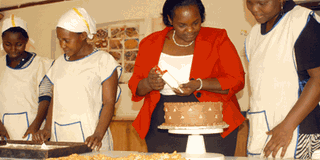Prime
Baking pastries from matooke flour

Director Jovay School of Cookery Ms. Jolly Kebirungi Gonahasa (2ndR) with some of her team after an interview with Daily Monitor paper about her tokoke products. Photo by Joseph Kigunddu.
You may have tasted bananas only in its natural form, after harvesting it from the banana plant. You may have got it in its raw form and prepared it for a meal and when you have it in large quantities, it may ripen, some of it rotting away and going to waste.
But with the presidential initiative on Banana Industrial Development (PIBID), the banana has become a long lasting commodity which can be stored for as long as a year in its processed stages.
Tooke products are the talk today in Uganda and even beyond. One of the brains behind this great initiative is Production, Development and Marketing Officer Jolly Gonahasa Kebirungi.
The 60-year- old Director AICA Group(Access. Interact. Create. Achieve), food scientist and researcher has taken on banana processing as the one thing to die for. She views it as a way of preserving food and increasing matooke in store, without having food wasted.
“We have so much matooke in Uganda whose quantities more than double during the peak season when so much is produced and a lot goes to waste due to high supply for the limited demand. This is when processing the matooke comes in handy,” she cheerfully says.
The project that has been ongoing for the last five years is aimed at increasing the processed bananas for export and increasing the food quantities to provide fair distribution of food throughout the country.
“Our problem in Uganda is not lack of food, it is the food distribution throughout the country. With this food processed, we can distribute it throughout the country particularly to areas that hardly access matooke.”
The products
The matooke is processed into four different products, raw flour, instant floor , matooke flakes and matooke soup— a product that is in the offing.
The raw flour is made from raw matooke and can be used as baking flour to make biscuits, cakes, pastry and also porridge. The advantage it has over wheat flour is the limited carbohydrates and fat levels within the product that makes it a healthier meal.
Instant flour is made from cooked matooke that is later dried and milled and with an addition of hot water; a meal will be ready to eat in three minutes.
“This meal is energy packed and readily available. It is used to make porridge, just like the raw flour, porridge that is highly nutritious and fast to prepare because all you need is hot water,” Ms Gonahasa explains.
The Bunyenyi-based company aims at increasing Tooke products—processed banana products to increase the exports and local consumption, away from the only five current markets— Dubai, US, Japan and Germany to many more markets in Europe, China, India among others. The highest they export so far is two tonnes every month but they hope to triple this number soon.
“We are officially completing the factory by June this year and we hope to expand our production to reach a wider market. We also hope to boost the school feeding programmes by providing them with matooke flour to be used in making porridge for the school children,” she says.
The company now employs about 100 people working in three different divisions— Production, Value addition and Marketing. But she targets employing close to 1,000 people, particularly young graduates to indirectly deal with the unemployment problem while ensuring food security in the country.
To accomplish this, Ms Gonahasa is working day and night to organise a Food and Beverages Expo that will offer a platform for the various food industry players and the food producers within the East African region to connect, network and explore new businesses in the industry. This expo is aimed at attracting at least 1,000 agro-business investors and producers to engage them in discussions that will open up their minds to have food readily available for all.
“We have a big gap between the producers, processors and the market which is why the so much food that is produced goes to waste.”
Ms Gonahasa believes that this will bridge the gap by creating a complete circle of food production, food processing, food consumption hence proper food distribution throughout the country.
“With proper distribution of food, we shall have enough for feeding the locals and excess food for export to increase the country’s export earnings,” Ms Gonahasa explains.
Her big heart that is out to see people live a better life, is what drives this mother of four. She has gone out of her way to teach people practical skills through her cookery school-Jovay School of Cookery in Wandegeya. Here she teaches school dropouts, holiday makers and the less privileged how to cook, at a fee of Shs400,000. She imparts her cookery skills in just a month and after this, one is good to go and cook for leisure and most importantly, to do it for a living.
“We dwell on practical skills here and many girls come without any knowledge on cooking but at the end of one month, they go away professional cooks,” she says giggling and smiling with satisfaction.
She also mothers six non-biological children as a way of giving back to the community. These, she says, bring fulfillment to her.
“I am a Christian so my aim is to help the needy and helpless. When I extend a hand to the community and share the little I have to better someone’s life, that is satisfactory enough for me.”
Utility: Located in Bushenyi, Ms Gonahasa is a food scientist and researcher who employs about 100 people processing bananas. She intends to bring the food and beverages producers, processors and the market together. She also has a school specialising in imparting cooking skills (Jovay School of Cookery Wandegeya), which she uses to give back to the community through teaching the less privileged and the disadvantaged.




